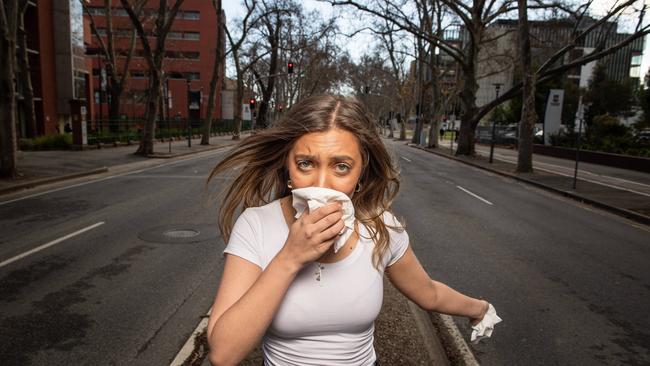University of Adelaide’s new pollen monitoring system begins with Asthma Australia
Anyone with asthma, hayfever, or both will welcome the arrival today of a new pollen monitoring system, and this time the University of Adelaide is in charge.

City
Don't miss out on the headlines from City. Followed categories will be added to My News.
- Winter: Councillor’s idea to reduce pollen
- 2016: Research finds SA is the hayfever capital
- This month’s subscriber rewards
Adelaide has a new pollen monitoring system to deliver timely warnings to sufferers of hay fever and asthma.
It’s the first-time scientists at the University of Adelaide have been responsible for the pollen count, which used to be performed at Adelaide Aerobiology Laboratory in Hindmarsh and published daily in The Advertiser.
Professor Michelle Waycott, also State Herbarium chief botanist, says the University stepped in to the void after the lab closed down.
“I think the fact that South Australia doesn’t have more effort going into this is something we need to address,” she said.
“That’s what this project is about, showing how important it is to capture this data in a serious way, because it does affect so many people’s health.
“It’s the right thing to do and it’s something that we want to see grow to a few more sites around the city by next season.”

The project is a partnership with Asthma Australia and the AusPollen Aerobiology Collaboration Network led by Queensland University of Technology.
The pollen count will be uploaded by 11.30am each day onto the Asthma Australia website at www.asthma.org.au/adelaide-pollen-count or by visiting the asthma triggers page and clicking on pollen. It is not a forecast service but shows pollen count over the past 24 hrs.
Professor Waycott says the pollen is captured using an instrument called a Burkard pollen trap. “The team undertake manual analysis of pollen grains under a microscope to determine concentrations of pollens in the air,” she said.
For this season the Adelaide Pollen Monitoring will focus on grass pollen, but levels of other pollen may also be reported as an indicator.

Mari Du Plessis of Prospect has asthma and hayfever but didn’t know about the service.
“I didn’t know you could check pollen,” she said.
“It will benefit the whole family, we can spend more time indoors and try to not wander around the parklands or gardens when the count is high or extreme.”
It comes as Adelaide City Council prepares to discuss Cr Alex Hyde’s push to reduce the amount of pollen in the CBD through increased street sweeping at a committee meeting tonight.
However, a council report said extra sweeping could not be justified because it “might be an ineffective and costly way to address the problem”.
Council have instead proposed monitoring the amount of complaints it receives about pollen for the next six months and, if necessary, would look at detailed research and risk assessment.

